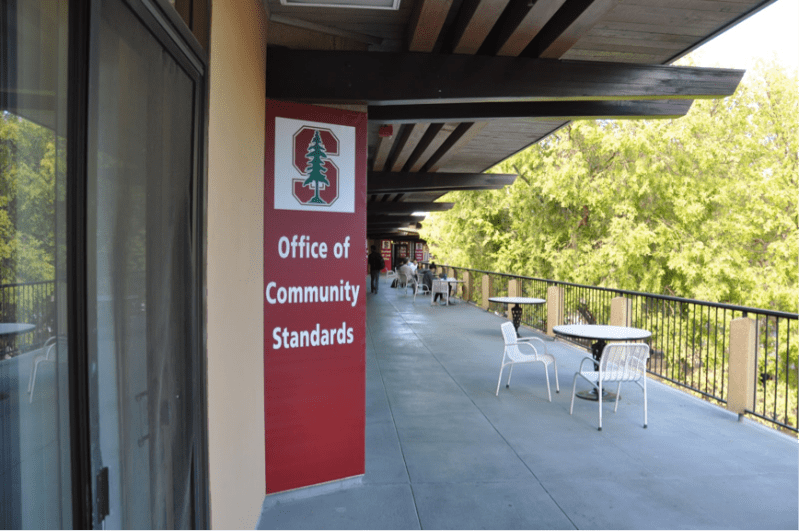In November 2014, Eamonn Callan, co-chair of the Judicial Affairs Internal Review Panel (IRP), presented findings from the IRP’s comprehensive analysis of Stanford’s judicial process, which included 23 recommendations for the University to improve in areas such as Honor Code and Fundamental Standard education.
While the Office of Community Standards (OCS) has followed up by working with specially created Board of Judicial Affairs (BJA) committees to promote awareness — creating an educational video and an open forum last May — they have yet to act on one of the study’s main recommendations, which was to create mandatory educational programs centered on the Honor Code and Fundamental Standard for new students and faculty.
Despite talk of changes to NSO programming, this year’s presentation of the Honor Code and Fundamental Standard at NSO was similar to that of previous years, featuring a customary speech by Provost John Etchemendy Ph.D. ’82.
By the time Callan presented the IRP analysis, which was commissioned in 2010, to the Faculty Senate last fall, nine of the improvements outlined by the IRP — from clarifications of the Fundamental Standard to the OCS’s name change — had already been carried out.
The remaining 14 recommendations spanned many facets of the judicial system, but a main theme was improving students’ and faculty members’ understanding of the Honor Code, said both Callan and Susan Fleischmann, the associate dean and director of the OCS.
One of the IRP suggestions was to form a group of students, faculty and staff within the Board of Judicial Affairs (BJA) devoted to outreach and education, leveraging high profile events such as NSO to increase awareness.
In response to this proposal, the BJA created two related subcommittees: one focused on outreach to students and one focused on outreach to faculty.
The student-centered group collaborated with the OCS on an educational video of students discussing the Honor Code, which RAs will screen in the dorms sometime this fall, Fleischmann said.
Fleischmann hopes that this new residential component will prove effective.
“There are a lot of programs that are put on in the dorms,” she said. “It’s where students live and communicate with each other and collaborate, and so I thought it was a natural fit.”
“The graduate life office will also have a copy, and they can post it on their website and refer students to it as well,” Fleischmann added. “So we do hope to reach the majority of Stanford students, because everyone is beholden to the terms of the Honor Code.”
The BJA’s two outreach groups also brought about last May’s open forum, “The Honor Code in the 21st Century,” which discussed issues such as exam proctoring.
“We felt good about that being the start of a conversation,” said BJA co-chair at the time Adam Horowitz M.A. ’10 Ph.D. ’16.
Horowitz said that although he hopes the conversation will lead to action, the BJA needs more time to gather feedback before considering with any specific policies.
“We want to hear from people around the community about how well the Honor Code is working, and how people would respond to potential changes,” he said. “That’s why I think that this year… is a good opportunity for that conversation to really happen, and then over the course of the next couple years, to see how that can translate into actual policy.”
Even if there was consensus on issues like exam proctoring, such revisions to the Honor Code would require a majority vote in the graduate and undergraduate student bodies before reaching the Faculty Senate – a lengthy process, Callan said.
“It’s really hard to get students to give serious attention to an issue like this,” Callan added. “Students tend to be so engrossed in their own studies that getting them to deliberate carefully about an issue like this, and then to go out and vote when the time comes – it’s difficult to get that level of participation.”
Beyond the BJA committees, the specific educational initiatives suggested by the IRP are still aspirational.
“We’re definitely thinking about it, but there’s nothing in place,” Fleischmann said of the mandatory Honor Code and Fundamental Standard program for new students.
“That’s something that the BJA will continue to work on and talk about with our student representatives who are in the ASSU or have connections with ASSU and can better gauge what students are willing to do – how they would like to be approached about this topic,” she added.
Similarly, the OCS is considering more robust education for new faculty but has no timeline for implementation yet.
“It’s really just about prioritization; other things related to education of both students and faculty were prioritized last year, like the video,” Fleischmann said. “We are continuing to discuss creating additional educational and outreach programs for students and faculty.”
Contact Hannah Knowles at hknowles ‘at’ stanford.edu.
